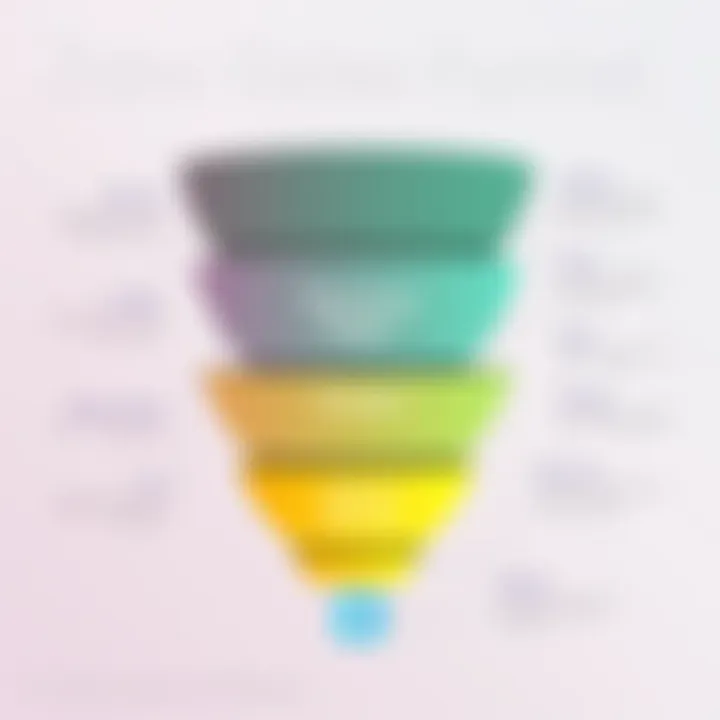Mastering the Zoho Sales Funnel for Business Success


Intro
In today's fast-paced business environment, having a streamlined sales process is more crucial than ever. Zoho Sales Funnel serves as a vital tool for organizations striving to manage their sales pipeline effectively. The emphasis on lead management and improved conversion rates cannot be overstated, especially for small to medium-sized businesses aiming to maximize their return on investment. This guide aims to delve into the intricacies of Zoho's functionalities and how it can elevate sales processes to new heights.
The practical application of this software goes beyond mere functionalities; it embodies a philosophy of evolving business operations. By utilizing the full suite of features offered by Zoho, organisations can empower their sales teams, create a more engaging customer journey, and drive meaningful conversations that lead to conversions. Hence, the significance of this guide lies not only in understanding what the Zoho Sales Funnel can offer but also in how it aligns with broader business objectives.
As we journey through this comprehensive guide, we will explore everything from the core purpose of this software, a closer look at its central features, and even a comparative analysis against competing solutions in the marketplace. This narrative aims to equip decision-makers with the insights they need to make informed choices regarding sales strategies and enhance overall business performance.
Prologue to Zoho Sales Funnel
Understanding the inner workings of a sales funnel is absolutely critical for businesses aiming to thrive in today’s competitive landscape. As markets continue to evolve, so too must the strategies employed by organizations that seek to funnel potential leads into loyal customers. The Zoho Sales Funnel serves as a powerful framework for managing this transformation more effectively.
In this guide, we’ll explore how the Zoho Sales Funnel enhances business processes by optimizing sales workflows, ensuring no lead falls through the cracks. The integration of Zoho’s suite of applications makes this funnel adaptable and efficient, allowing businesses to tailor it to their unique requirements. As we delve into this topic, it’s essential to recognize that having a structured sales funnel is not just about closing sales—it's also about nurturing relationships with clients, understanding their needs, and providing value.
Understanding the Concept of Sales Funnels
At its core, a sales funnel represents the journey that potential customers take, from first awareness of a product or service, all the way to making a purchase and beyond. Think of it like a sieve; you start with a wide opening where you generate leads, and as the process narrows, those leads are filtered based on their interest, engagement, and readiness to buy. The stages usually include:
- Awareness: Customers become aware of a problem or need.
- Interest: They express interest in solutions, researching options.
- Consideration: This is where they evaluate different products or services.
- Intent: Intent to purchase begins to develop, often indicated through actions like placing items in a shopping cart or requesting a quote.
- Purchase: The final stage where the lead converts into a customer.
Understanding these stages helps businesses tailor their marketing efforts. By employing Zoho’s capabilities, businesses can effectively track where leads are in this funnel, making it easier to guide them toward a purchase.
The Evolution of Sales Processes
Sales have come a long way from the days of cold calling and face-to-face meetings. Digital transformation has reshaped how businesses connect with customers. In the early days of sales, it was all about direct contact and manual tracking—think physical notepads and phone logs. Fast forward to today, where technology has revolutionized sales processes, cloud-based tools and analytics play a massive role. Sales funnels have shifted accordingly:
- From Manual Tracking to Automated Solutions: The rise of CRM systems like Zoho means teams can automate and monitor their entire sales processes, gaining real-time insights.
- Data-Driven Decisions: Businesses are more data-savvy than ever, relying on analytics to determine which strategies yield the best results. Mining held information gives leverage to adjust tactics quickly.
- Personalization: Customers now expect personalized experiences. This shift has led to the need for tailored approaches that address individual prospect needs, something Zoho allows through customized workflows.
This evolution signifies not only a change in strategy but also an adaptation to consumer behavior. Today’s consumers are informed and empowered, meaning businesses can't afford to treat sales like an afterthought. Zoho provides the necessary tools to make an organization agile and responsive, transforming how sales professionals engage with customers.


By understanding these subtleties of the sales funnel and leveraging them effectively with Zoho, businesses can set themselves up for sustained success in a rapidly changing environment.
The Role of Zoho in Modern Business
In today’s fast-paced commercial landscape, the choice of tools that businesses employ can make or break their operational efficiency and effectiveness. Here’s where Zoho comes into the picture, transforming the way organizations conduct their sales processes. With its intuitive interfaces and comprehensive functionalities, Zoho isn't just another software in the market; it has cemented itself as a vital asset for modern enterprises.
An Overview of Zoho's Suite of Applications
Zoho offers a sprawling suite of applications designed to meet a myriad of business needs. From customer relationship management to project management, finance, and human resources, every application plays a crucial role in facilitating smooth business operations. Here’s a snapshot of some standout offerings:
- Zoho CRM: This is perhaps the flagship product that helps businesses manage customer interactions and data throughout the customer lifecycle.
- Zoho Books: A valuable tool for managing finance and accounting tasks with features like invoicing and expense tracking.
- Zoho Campaigns: This helps businesses run targeted email marketing campaigns, essential for nurturing leads and maintaining customer relationships.
- Zoho Projects: A project management tool that ensures teams stay organized and on track with their project goals.
Together, these applications create a robust ecosystem that encourages collaboration and streamlines workflows, allowing small to medium-sized businesses to punch well above their weight.
Benefits of Using Zoho for Sales Management
Implementing Zoho for sales management brings a wealth of benefits that can redefine how an organization handles its sales processes. Here are some of the key gains:
- Streamlined Lead Management: With features such as lead capture from various sources, Zoho allows businesses to effectively track and follow up on potential customers without missing a beat.
- Customization: The application suite can be tailored to meet specific business needs, allowing teams to set up custom sales pipelines that reflect their unique sales processes.
- Improved Collaboration: Integration amongst Zoho applications means that sales teams, marketing professionals, and customer support can work together seamlessly, ensuring that everyone is on the same page.
- Automation Features: Businesses can automate repetitive tasks, like sending follow-up emails, which frees up time for sales representatives to focus on closing deals rather than getting bogged down in administrative tasks.
- Comprehensive Reporting: With built-in analytics tools, organizations can track performance metrics and gain insights into their sales processes, helping them make data-driven decisions.
By leveraging the power of Zoho’s platform, businesses can turn their sales operations into a finely-tuned machine.
Using Zoho not only streamlines operations but also anchors teams with the insights and tools they need to thrive in a competitive environment. Thus, adopting Zoho can be a significant step forward for small to medium-sized businesses looking to enhance their sales management strategy.
In summary, Zoho's importance in modern business lies in its ability to provide a cohesive and integrated approach to sales management. As more businesses place emphasis on efficiency, the role of tools like Zoho will only continue to grow.
Components of the Zoho Sales Funnel
Understanding the components of the Zoho Sales Funnel is pivotal for businesses aiming for robust sales optimization. These components come together like pieces of a puzzle, each serving a unique role while also contributing to the greater picture of lead management and sales progression. When deployed effectively, they ensure a seamless journey from initial lead capture to the final sale. This section delves into three critical components: Lead Capture and Tracking, Lead Qualification Processes, and Opportunity Management.


Lead Capture and Tracking
Lead capture is the lifeblood of any sales funnel. It's where relationships begin, and without effective capture strategies, potential clients can slip through the cracks faster than you can say "lost opportunity." Zoho facilitates this through multiple tools that create a systematic approach to gathering leads. You get multiple avenues, whether it’s through web forms, social media, or email campaigns—this flexibility helps tailor your lead capture to the audience you want to reach.
Tracking leads goes hand-in-hand with capturing them. Knowing where each lead comes from allows businesses to focus their efforts on what works best. With Zoho's capabilities, you can assign sources to leads, track their interactions, and analyze their behaviors over time. This combination of capturing and tracking can lead to more engaged prospects, thus enabling better-informed decisions down the line.
"Leads are not mere numbers; they're potential relationships waiting to be formed."
Lead Qualification Processes
Once leads are captured, the next important step is qualification. Not every lead has the same value or intention, so having a rigorous qualification process helps in differentiating the wheat from the chaff. Zoho incorporates lead scoring systems that evaluate leads based on various criteria such as engagement level, demographic information, and fit with your ideal customer profile. This allows sales teams to focus their efforts on leads most likely to convert, maximizing efficiency.
Consider the importance of follow-ups. A qualified lead may deserve a personalized follow-up strategy, enhancing the chances of closing the deal. The system can automate reminders and tasks to ensure that no lead is overlooked. In short, lead qualification processes within the Zoho Sales Funnel pave the way for a streamlined sales journey, ensuring that the most promising leads are prioritized.
Opportunity Management
Opportunity management is where the rubber meets the road. This element of the sales funnel signifies the potential to convert those nurtured leads into customers. Zoho provides sales teams with tools to track opportunities at various stages: from initial contact to final negotiation. Managing opportunities effectively can make or break your sales performance—it's imperative to know what stage each opportunity is in, and what future actions are necessary.
Moreover, forecasting becomes an essential subset of opportunity management. Being able to analyze past sales data helps predict future performance, aiding in resource allocation and strategy formulation. With a systematic approach, team collaboration improves as everyone stays informed about each opportunity's status. Notably, sharing insights can also foster a culture of accountability within the team.
Customizing the Zoho Sales Funnel
Customizing the Zoho Sales Funnel is an essential element in elevating business processes. It allows businesses to tailor their sales management processes according to their specific needs, which is key to optimizing performance. Each business is unique, and one-size-fits-all approaches often fall short. Customization leads to more effective strategies, with the sales funnel reflecting real-world practices rather than generic standards. Additionally, customized funnels ensure that potential customers receive the right information at the right time, significantly enhancing their journey through the sales process.
Setting Up Your Sales Funnel
Setting up your sales funnel in Zoho is a significant first step that dictates how potential customers will interact with your business. In this phase, understanding your target audience is vital. Who are your ideal customers? What problems do they face? Knowing the answers to these questions will shape how you structure your sales funnel.
- Identifying Your Stages: Typically, a sales funnel has several stages: awareness, consideration, and decision. However, depending on your business, you can introduce more stages or even combine some. For instance, if you sell high-ticket items, an additional nurturing stage might be necessary.
- Utilizing Zoho's Tools: Zoho provides functionalities to create custom stages for your funnel, allowing you to categorize leads effectively. This way, you can pinpoint where in the journey each lead resides. Here's a simple example of a customized funnel you might consider:


- Lead Generation
- Initial Contact
- Needs Analysis
- Proposal Creation
- Closing
By strategically designing your sales funnel based on your knowledge of the customer journey, you can better engage potential leads.
Configuring Stages and Milestones
Once the sales funnel is set up, configuring stages and milestones becomes necessary for tracking progress and measuring success. Each stage should reflect a clear-functioning segment of the customer's journey. Milestones within these stages allow businesses to assess whether they are meeting their sales goals.
- Define Milestones Clearly: For each stage, determine what milestones you want to establish. For instance, reaching out to a certain number of leads could be a milestone in the Initial Contact stage.
- Measuring Progress: Use Zoho's reporting tools to track how many leads move through each stage. This ensures you understand where potential bottlenecks exist.
- Adjust Accordingly: If you notice too many leads stall at a particular milestone, examine your approach in that area. Are you providing sufficient follow-up? Is your messaging effective? Adjusting your strategy based on tangible data is crucial.
Integrating with Other Zoho Applications
Integrating the sales funnel with other Zoho applications can take your sales operations to the next level. When various tools work in harmony, it flows like water under a bridge, making processes smoother.
- Zoho CRM: Integration with Zoho CRM ensures all customer interactions are tracked in one location. You can view past communications, activities, and more, allowing for focused follow-ups.
- Zoho Analytics: This helps in measuring the effectiveness of customized funnels. Utilizing analytics allows you to draw data-driven insights, making adjustments easier.
- Zoho Campaigns: By connecting with your sales funnel, you can automate your marketing campaigns based on where leads are in the funnel. A lead in the consideration stage may benefit from targeted email content, while those in the closure stage might appreciate reminders about upcoming offers.
Utilizing these integrations maximizes efficiency and ensures that your sales team has all the resources they need to convert leads into customers.
"In a rapidly evolving landscape, customizing each element of your process can be the difference between merely surviving and truly thriving."
By focusing on customizing the Zoho Sales Funnel, businesses can create a tailored experience that speaks to their customer's needs. More importantly, this approach helps in forming meaningful connections, leading to lasting customer relationships.
Utilizing Analytics in Zoho Sales Funnel
Understanding analytics in the context of the Zoho Sales Funnel offers businesses a significant edge. With the sheer volume of data available today, having a robust framework for analyzing that data can make all the difference between thriving and merely surviving in competitive markets. Analytics not only aids in assessing performance but also provides insights that drive smarter decision-making.
Measuring Conversion Rates
Conversion rates are the real heartbeat of any sales funnel. They tell a story about how well potential leads are being turned into customers. By measuring these rates accurately, businesses can pinpoint which stages of their funnel are effective and which are lagging. Imagine you’re running a small business selling sustainable home goods. If your conversion rate from inquiry to sale is woefully low, it might suggest that the messaging in your follow-up emails isn’t resonating.
To calculate conversion rates using Zoho, the formula is simple: divide the number of conversions by the total number of leads and multiply by 100 to get a percentage. Thus, if you had 50 conversions out of 1,000 leads, your conversion rate would be:
(50 / 1000) * 100 = 5%



